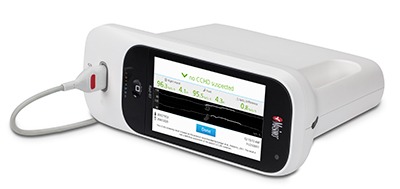
This latest phase in Saudi Arabia’s national CCHD screening program, which began in 2016 as part of the Vision 2030 plan addressing improvements in healthcare and other areas, automates the collection and storage of screening data, helping to make the process both more efficient and more accurate.
In 2016, Saudi Arabia implemented a mandatory CCHD screening program for all newborns using the Masimo Eve Newborn Screening Application on Radical-7 Pulse CO-Oximeters with SET Measure-through Motion and Low Perfusion™ pulse oximetry technology.
Over 100 independent and objective studies have shown SET to outperform other pulse oximetry technologies. Crucially for newborn health, studies – including the largest CCHD screening study to date – have shown that SET combined with clinical assessment significantly improved CCHD screening sensitivity.
With its ability to accurately measure through motion and low perfusion, alongside its performance in outcome studies, SET stands out as the most proven and established choice of pulse oximetry technology for clinicians and policy makers hoping to implement CCHD screening processes. Since the program began in 2016, more than 600,000 Saudi Arabian newborns have been screened using SET, Radical-7, and Eve.
In 2018, Eve on Rad-97 Pulse CO-Oximeters was added to the program. Masimo SET, coupled with Eve to streamline the screening process, and now with Rad-97 and automated data collection and aggregation, provides a powerful and the only automated CCHD solution of its kind available worldwide. Last year alone 72 newborns were referred for CHD diagnosis and heart surgery to save their lives, as a result of positive screening results.
The screenings are carried out at 200 medical centers operated by the MOH, with a further 170 private hospitals adopting the screening process in late 2018. By 2020, it is estimated that 550,000 newborns annually will be screened in Saudi Arabia.
Dr. Fahad A. Al Aql, advisor to the MOH responsible for implementing the CCHD screening program, commented, “We are thrilled to be able to announce that in 2018 alone, widespread use of our national CCHD screening protocol, facilitated by Masimo technology, caught 72 instances of CHD that might otherwise have gone undetected.
Now, in this next phase, which we plan to implement nationwide by February, we are augmenting our screening program with additional technology – making it the only automated solution that uses Rad-97 and Eve – that we believe will make the process faster, easier for clinicians to perform, and less prone to error. Patient identification can be quickly accomplished through barcode wristband scanning, and the results, calculated by Eve, will be collected and uploaded to central EMRs automatically, without the need for manual transcription. More efficient, more accurate healthcare is a cornerstone of Vision 2030. With the support of His Excellency the Minister of Health, Dr. Tawfiq Al Rabiah, we are looking forward to continuing to advance the forefront of healthcare in Saudi Arabia with this implementation.”
Eve, available on Radical-7 and Rad-97, combines the power of Masimo SET® pulse oximetry with an automated pre- to post-ductal synchronization algorithm designed to reduce calculation errors during CCHD screening.
In addition, Eve simplifies the CCHD screening process by providing visual instructions, animations, and a detailed, easy-to-interpret display of screening results. Saudi Arabia’s automation solution uses Masimo Iris Gateway to record and transmit screening results, labeled with unique patient identifiers for both mother and newborn, from Rad-97 and Radical-7 devices to hospital and national electronic medical record (EMR) systems, for efficient, accurate electronic charting and data aggregation in a unified, central health repository.
CCHD affects approximately 2.5 to 3 newborns per 1000 live births4 and requires intervention soon after birth to prevent significant morbidity or mortality; later detection in infants also increases the risk of brain damage.5 In a study of 39,821 infants, CCHD screening sensitivity increased from 63% with physical exam alone to 83% with physical exam and Masimo SETpulse oximetry.
In a study of 122,738 infants – the largest CCHD screening study to date – CCHD screening sensitivity increased from 77% to 93% with the combined use of Masimo SET and clinical assessment.
Source: Company Press Release






